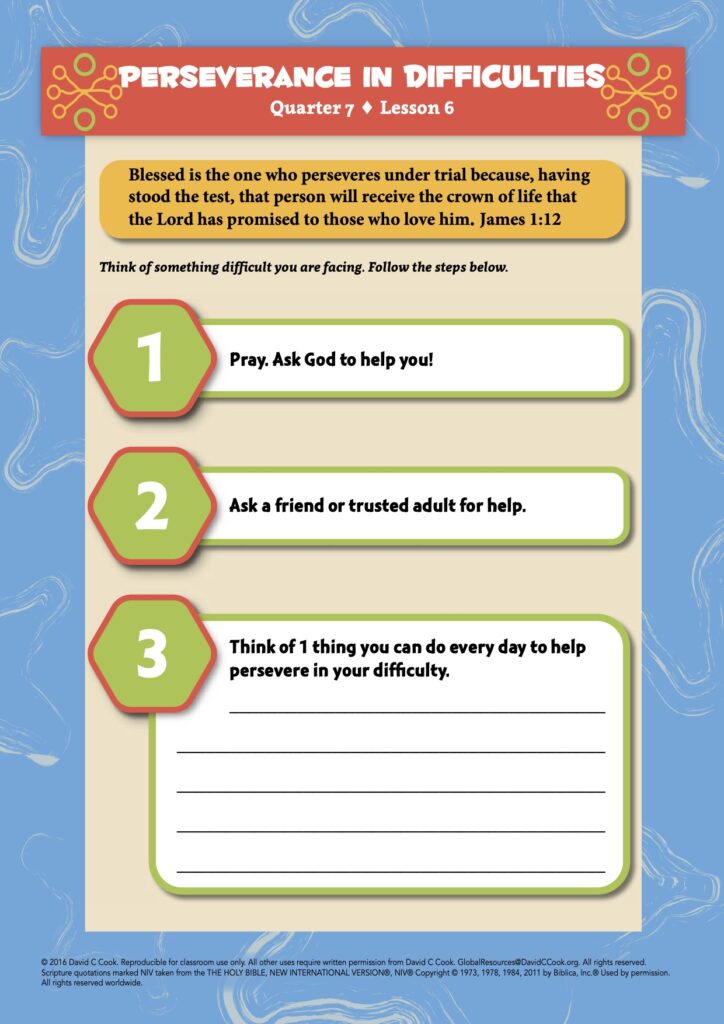During the lesson, the information for you to know is written in regular type, and what we suggest speaking or reading aloud to children is in bold. All resources for this lesson, including the Teacher Guide, Student Page, Family Connection Card, and other resources can be downloaded in a ZIP file by clicking on the following link:
In some lessons you will find "resource articles." These are articles written by experts from around the world to help equip you for your work with children and adolescents. Share them with parents or guardians if you consider it appropriate.
Before class, create a simple obstacle course with 4–5 obstacles. Designate the start and finish lines. Use available objects or furniture for the obstacles. For example, children might crawl under a table, skip around a rock, do 5 jumping jacks, sit in a chair, toss a rag in the air, and jump to the finish line. Make a few of the obstacles more difficult than the others. If you have a large class, set up 2 obstacle courses.
Therefore we do not lose heart. Though outwardly we are wasting away, yet inwardly we are being renewed day by day. For our light and momentary troubles are achieving for us an eternal glory that far outweighs them all.
2 Corinthians 4:16–17
When facing difficulties, it can feel easy to give up. Think of a time in your life when you faced a difficulty but persevered. How did that circumstance feel at the time when you felt weak or like a failure? How does that circumstance look from the perspective of your present? You persevered!
You overcame that difficulty. God wants us to keep that goal in sight so that we will have the strength to persevere.
If you are facing a difficulty right now, do not dwell on it. Instead, turn your attention toward Jesus, the Source of life and strength. The only way to truly fail is to give up. God uses difficult times to strengthen us, and He never leaves us alone. So cry out to God in the situation. He will hold you up. God allows you to go through storms so that your roots grow deeper into Him. Therefore, praise Him in the storm!
Let the families of the children know that this week they are learning about persevering in difficulties. Ask them to share with their children times from their own lives when they persevered and what the results of persevering were.
Teacher Tip: If possible, email or text the Family Connection Card to the families of your students.
Greet your children with a friendly gesture as they arrive, such as a hand shake, a high five, or a gentle pat on the back. Tell them you are happy to see them. This lets the children know you notice and value them.
Ask the children not to touch the obstacle course items yet. Tell them that they will go from obstacle to obstacle. Explain what they need to do at each obstacle. If possible, demonstrate each obstacle while you explain it or have a child demonstrate. Explain that children will line up at the start line and go through the obstacle course 1 at a time. When they finish, they should cheer for the children doing the course. They can clap, encourage them with positive words, and give them high fives when they finish. Choose an outgoing child to go first so she can set an example of cheering for the other children.
Send children through the obstacle course. If possible, have each child start when the child before him is halfway through. If you have a large class, set up 2 obstacle courses and split the children into 2 groups. When they have finished, ask them to sit down.
Each of you just demonstrated wonderful perseverance!
I am proud of the way each of you persevered to overcome every obstacle in this course! It was hard work. But when you finished, you probably felt a sense of accomplishment. Today you will learn about persevering in spite of difficulties and obstacles. After making it through that obstacle course, you are off to a good start!
We have learned about Joseph before. Listen again today and see what new things you can learn. Joseph was a young man who understood what it meant to persevere. Listen to his story.
A man named Jacob lived in the land of Canaan. He had 12 sons. Of all his sons, Jacob loved Joseph best of all. Because Jacob loved Joseph the most, his brothers were jealous of him. When Joseph was a teen, Jacob had a beautifully ornamented coat made for him, and this made his brothers even more jealous. Their jealousy turned to hatred.
The brothers seized Joseph, tore off his beautiful coat, and threw him into a pit. A group of traders on their way to Egypt came by on camels. The brothers sold Joseph to them as a slave.
The brothers killed a goat and dipped Joseph’s coat in the goat’s blood. When the brothers returned home, they showed Joseph’s coat to their father. Jacob was convinced that a wild animal had killed his beloved son.
The traders who had bought Joseph from his brothers took him to Egypt. There they sold him as a slave to a man named Potiphar. Joseph was a good slave, and Potiphar was kind to Joseph. However, one day Potiphar’s wife became angry with Joseph, and she lied about him to Potiphar. Potiphar believed her lie. He put Joseph in prison. Once again, Joseph was betrayed and alone.
Allow 2–3 children to share their ideas.
Joseph may have felt lonely and afraid. However, he persevered and kept working hard every time he had the opportunity to do something.
One day Egypt’s ruler, called Pharaoh, sent his baker and his cupbearer to prison. Later they each had a strange dream on the same night and told Joseph about them. Joseph knew that God would show him the meaning of the dreams, so he said, “Only God knows what your dreams mean. I will ask God to tell me the meaning.”
God showed Joseph what the strange dreams meant, and Joseph’s interpretations of both dreams came true. The cupbearer was able to return to his duties with the Pharaoh. Two years later, Pharaoh had 2 strange dreams the same night. The cupbearer remembered that Joseph had been able to help him understand his dream. He told Pharaoh about Joseph.
Pharaoh sent for Joseph and asked him to interpret his strange dreams. Joseph replied, “Only God can tell the meaning of your dreams. Tell me the dreams, and I will ask God the meaning for you.”
After Pharaoh told Joseph about his strange dreams, God revealed their meanings to Joseph. When Joseph told Pharaoh what his dreams meant, he thought Joseph was very wise.
Pharaoh made Joseph governor over all of Egypt and told all the people of Egypt to do just as Joseph said.
Joseph was betrayed and abandoned several times, but he did not give up. He persevered in very difficult situations, and God did not leave him.
Allow children to share their ideas. If needed, suggest that Joseph persevered when his brothers threw him in a pit and sold him as a slave. He also persevered when Potiphar put him in prison unjustly.
Optional: If you are using The Action Bible, encourage the children to read parts of Joseph’s story on pages 89–90, 91–93, 94–95, and 96–98.

Have the children turn to their neighbours and discuss the next question.
Give a few children the chance to share their answers in just 1–2 sentences with the class. This is also a good time to share about a time you persevered in a difficult situation.
Tell the following stories to your children. Explain that the person in each situation persevered. Ask the children to suggest what the outcomes of the mini-stories might be.
Let’s read a Bible verse about persevering in difficult situations.
Show the memory verse poster if you are using it.
Blessed is the one who perseveres under trial because, having stood the test, that person will receive the crown of life that the Lord has promised to those who love him.
James 1:12

Persevering in trials, or difficult situations, is hard. But the Bible calls those who do it blessed or happy! Like Joseph, sometimes your situation will change in positive ways when you persevere. However, sometimes it will not. Still, persevering at something worthwhile is always a good thing! It helps you to become a better, more mature person.
Here are 3 things you can do to help you persevere in difficult things:
Divide the children into pairs. They will remain with their partners for the rest of class. Give them 1 minute to share things that are easy for them to do. They might share things such as making friends, doing math, or listening well to the teacher. Next, give them 1 minute to share things that are difficult for them to do.
Optional Supplies:
Give paper and pencils to the children. Have them write a list of 5 things that are easy for them to do. Next have them write a list of 5 things that are difficult for them to do. They can share their lists with a partner. If you are using Student Pages, there is space for the children to write about what they will do to persevere in a difficult situation.
End of Option

Each of us has different strengths and weaknesses. Strengths are things we do well. Weaknesses are things that are more difficult for us to do. When you keep trying hard at things that are difficult, you will most likely get better and better at them. When you persevere, your weaknesses can turn into strengths!
Nicholas, Michael, and Sharot each faced a difficult situation. But they each chose to persevere in their difficulties. Think about a difficult situation that you face. Take turns sharing the situation with your partner. Help each other think of specific things you can do to persevere. You can use the ideas I gave you—pray, ask others for help, and start with something simple—or you can think of others.
Close class by praying this blessing based on James 1:12 over the children:
Blessing: Blessed is the child who perseveres under trial! May you be like Joseph, who persevered in very difficult situations. May you always remember that God is with you and will help you!
Lead the children in singing this quarter’s song, if possible.
Life on Life ©2020 David C Cook. Reproducible for home or classroom use only. All other uses require written permission from David C Cook [email protected]. All rights reserved.